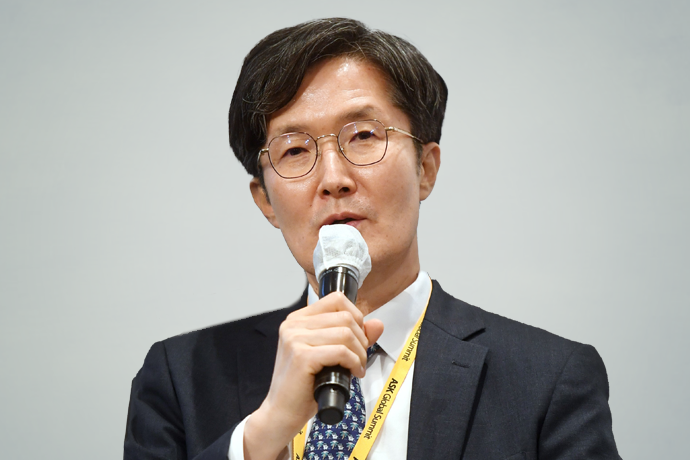[Interview] Alternative investments
POBA CIO advises against traditional asset mix, definition
Blurred lines between industries are transforming niche assets into mainstream investments
By Jun 30, 2021 (Gmt+09:00)
3
Min read
Most Read
CarlyleŌĆÖs Rubenstein sees commercial real estate undervalued


Infrastructure secondaries continue to rise amid inflation: Stafford


Goldman Sachs names Choi Seoul office chief


Golf equipment maker Taylormade to refinance $222 mn of debt


NPS' former key players move to law firms as its voting power increases



As the ultra-low bond yields weakened the role of bonds as a hedge against equities, investors are now advised to abandon the traditional formula that equities are equal to risky assets, bonds are safe havens and alternatives are medium-risk medium-return assets, POBA's CIO Jang Dong-hun told Market Insight.
"The global pandemic has changed the traditional asset allocation rules. If we do not catch up with the change, we can't guarantee long-term returns," he said in a recent interview. Market Insight is the capital news outlet of The Korea Economic Daily.
Driven by technological development, in particular, in areas such as artificial intelligence and semiconductor, the categorization between main and niche assets has changed as well. As an example, logistics centers, research labs, data centers and communication towers are transforming from a niche in the alternative investment market into mainstream assets.
"Since the pandemic began, we have increased allocations to fixed income-type alternatives ranging from private debt to publicly traded REITs and listed infrastructure. They produced handsome returns," Jang said.
In the extended period of ultra-low interest rates and expansionary fiscal policy, the correlation between stocks and bonds has turned positive, in other words, their prices move in sync. That would suggest bonds no more act as a safety valve in a portfolio.
"The key is we need to try to make asset allocations totally different from the previous ones, based on deep analysis of the risk and return characteristics of all asset classes," the CIO noted.
POBA's recent steps illustrated the change in its investment strategy. Since 2018, POBA has joined forces with the California State TeachersŌĆÖ Retirement System (CalSTRS) to launch four joint ventures to invest about 1.9 trillion won ($1.7 billion) in US commercial real estate loans, US multifamily assets and private debt.┬Ā
Jang is among the country's first-generation fund managers who spearheaded mutual funds named after them. During his stint at Korea Investment Management Co. in 1998, he ran a mutual fund, dubbed "Jang Dong-hun fund."
ESG AS PART OF ALTERNATIVE TO FIXED INCOME STRATEGY
Regarding the environmental, social and governance (ESG)-themed investing, POBA could adopt the criteria as part of alternative investments to fixed-income strategy.
"Among the strategies of ESG investing, some analyses show the low correlation between impact investing and stocks and bonds," he said. "From the perspective of a balanced portfolio, the ESG principles may help solidify our portfolio."
Impact investing refers to a strategy of investing in companies and funds with an aim to make measurable social or environmental impact, alongside financial returns.
Additionally, POBA has been stepping up exposure to separately managed accounts (SMAs) to speed up investment execution and quickly adapt to the changing market environment. SMAs are managed on behalf of a single limited partner and under its instructions.
Recently, POBA is diversifying the target of its SMA investments into life science buildings, last-mile distribution centers and student housing facilities in Europe for its latest mandate of 270 billion won.
"We're setting up dedicated funds to grab co-investment opportunities offered by general managers, in time. We will build a system to respond quickly to the markets that have been changing faster than ever before."
POBA is a $15 billion retirement fund for South Korea's provincial government employees. Jang has been heading the POBA's asset management since 2015 as the longest-serving CIO among Korean pension and savings funds. Since he took the reins in 2016, POBA has achieved an average 6.9% in return per year, topping its target of 5.5%.
Write to Jung-hwan Hwang and Jun-ho Cha at jung@hankyung.com
Yeonhee Kim edited this article.
More to Read
-
 ASK 2021 CIO panel talksPOBA CIO says to expand SMAs, co-investment platforms
ASK 2021 CIO panel talksPOBA CIO says to expand SMAs, co-investment platformsMay 14, 2021 (Gmt+09:00)
5 Min read -
 Alternative investmentsPOBA eyes life science buildings, student housing in Europe via SMA
Alternative investmentsPOBA eyes life science buildings, student housing in Europe via SMAJun 22, 2021 (Gmt+09:00)
1 Min read -

Comment 0
LOG IN


